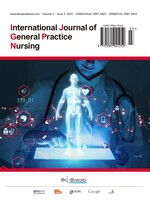Application of Proactive Risk Intervention Combined with Meticulous Nursing in Neonates with Respiratory Distress Syndrome
Abstract
Objective: To analyze the value of proactive risk intervention combined with meticulous nursing in neonates with respiratory distress syndrome (NRDS). Methods: 62 NRDS neonates who visited the hospital from August 2024 to August 2025 were selected as samples and randomly divided into groups. Group A received proactive risk intervention combined with meticulous nursing, while Group B received routine intervention. Treatment indicators, blood gas indicators, respiratory rate, heart rate, SNAP-II score, and complications were compared between the two groups. Results: The oxygen inhalation time, mechanical ventilation time, time to restore body temperature, and hospitalization time in Group A were shorter than those in Group B (P < 0.05). The arterial oxygen partial pressure (PaO2), oxygen saturation (SaO2), and carbon dioxide partial pressure (PaCO2) in Group A were better than those in Group B (P < 0.05). The respiratory rate, heart rate, and SNAP-II score in Group A were better than those in Group B (P < 0.05). The complication rate of NRDS in Group A was lower than that in Group B (P < 0.05). Conclusion: NRDS neonates who received proactive risk intervention combined with meticulous nursing had stable heart rate and respiratory rate, improved blood gas indicators, shortened disease duration, and were highly effective and feasible.
References
Ke XQ, Ma JP, Bao CY, 2022, Application of Refined Nursing Model Based on FMEA Combined with Early Prone Position Ventilation in Patients with Acute Respiratory Distress Syndrome and its Influence on LBP, sTM, and EVLWI. Chinese Journal of Emergency Resuscitation and Disaster Medicine, 17(4): 512–516.
Liu WJ, Yu YL, Huo MC, et al., 2022, Observation on the Effect of Refined Airway Management on Improving Blood Oxygen in Neonates with Respiratory Distress Syndrome. Chinese Medical Record, 23(8): 88–91.
Xu YL, Fu J, Wei GY, 2024, Observation on the efficacy of caffeine combined with Nasal High-flow Oxygen Therapy in the Treatment of Neonatal Respiratory Distress Syndrome. China Journal of Modern Medicine, 34(8): 95–100.
Li L, Zhang ZH, Zhang HQ, et al., 2017, Observation on the Efficacy of Continuous Positive Airway Pressure Combined with Curosurf in the Treatment of Neonatal Respiratory Distress Syndrome. South China Journal of Medical Sciences, 45(5): 499–502.
Zhang XW, Liu YY, 2023, Application Effect of Continuous Positive Airway Pressure Combined with Fine Nursing in Neonates with Respiratory Distress Syndrome. China Modern Medicine, 30(15): 176–179 + 184.
Wang JL, Hu QY, Wei B, et al., 2023, Effect of Refined Intra-abdominal Pressure Management on Respiratory Function in Patients with Severe Acute Pancreatitis Complicated with Acute Respiratory Distress Syndrome. Guangxi Medical Journal, 45(16): 1921–1927.
Yao W, Li J, Lu J, 2024, Application Value of Refined Nursing in Ventilator-assisted Ventilation Therapy for Neonatal Respiratory Distress Syndrome. Chinese and Foreign Medical Treatment, 43(8): 175–178.
Deng LZ, Liu XX, 2024, Study on the Application Effect of Proactive Risk Nursing in Neonatal Respiratory Distress Syndrome. Contemporary Medicine Forum, 22(16): 157–159.
Wei D, Li N, Yao XM, 2021, The Influence of Goal-oriented Refined Nursing Intervention on Neonatal Respiratory Distress Syndrome. Qilu Journal of Nursing, 27(21): 1–4.
He GM, Shen P, Chen MH, 2023, Proactive Risk Nursing for Neonatal Respiratory Distress Syndrome. Nursing Practice and Research, 20(8): 1174–1177.

